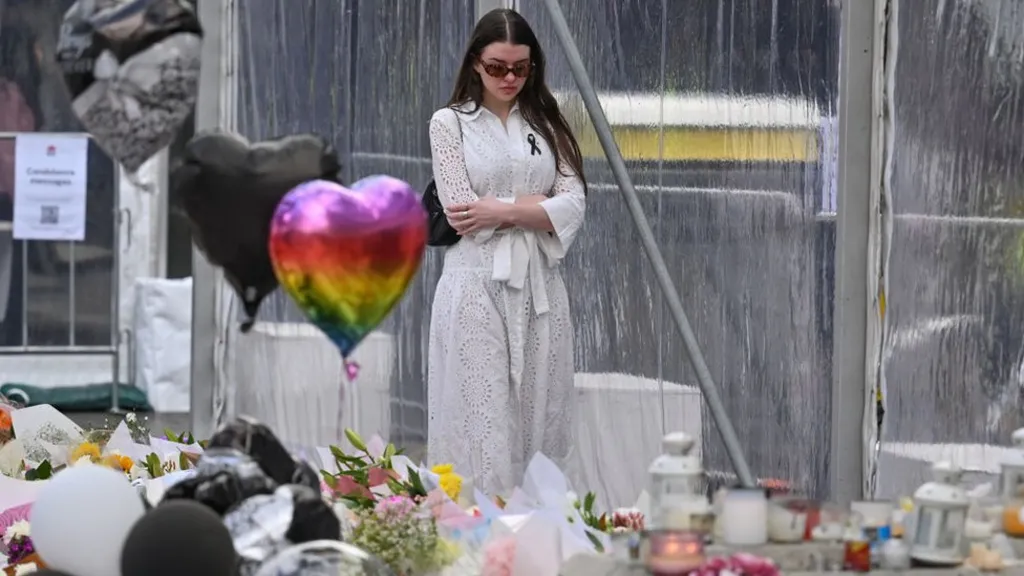Sydney stabbing: Bondi attack on women devastates Australia Leave a comment
It seems like all of Australia can see themselves in the victims of Saturday’s stabbing rampage at a crowded shopping centre in Bondi Junction.
There was a new mother stealing a moment for herself. A refugee security guard only a week into his new job. The daughter of a millionaire excitedly wedding planning. An international student seeking retail therapy after exams. Parents who never went home to their kids.
The attack – in a nation where mass murder is so rare – has stunned the world and raised uncomfortable questions for Australia.
“I mean, terrible things happen all the time,” Anita, 33, tells the BBC as she is leaving flowers at an ever-growing memorial. “But the fact that it happened here – where you least expect it, in such a heinous way – definitely hits home.”
Within moments of entering the centre on Saturday afternoon, Joel Cauchi selected his first victim – a woman – and stabbed her with a large knife, reportedly from behind.
Over the next 20 or so minutes – police are yet to reveal exactly how long – Cauchi roamed around three levels of the palatial shopping centre, sending scores of people running in terror.
Videos captured by frightened shoppers show him chasing or lunging towards several men, but ultimately leaving them alone.
Meanwhile, the pile of bleeding women he left in his wake grew and grew.
There were three outside a Country Road store. Two on the ground inside Chanel. Another couple near Cotton On.
All up, 14 of the 17 people he stabbed were female – including five of the six people who were killed, and a nine-month-old baby.
Mary – who asked we not use her last name to protect her family’s privacy – was one of the many women who sheltered in a store, horrified, as Cauchi prowled outside.
On the other side of the glass, he walked right past her, his right hand clutching a hunting blade and swinging it at his side.
As terrified customers locked inside shops saw their phones light up with frantic messages, Mary soon heard about one woman being stabbed, then another, and then another. The penny dropped.
“I thought, ‘He’s going after women’.”
By Monday morning, police too said it was “obvious”.
“The videos speak for themselves, don’t they?” commissioner Karen Webb said.
“The offender focused on women and avoided the men.”
But as stories of horror leaked out of the centre, so did tales of heroism.
The French tradesman – now dubbed Bollard Man – who tried to stop Cauchi’s carnage. Security guard Faraz Tahir who was stabbed alongside a colleague and died “trying to save others”.
Poignantly, many of the heroes of Saturday were women too.
There was Ashlee Good, spending her last moments desperately trying to get help for her baby. Good died in hospital on Saturday night, as her child was rushed to surgery.
Huma Hussainy in graphic detail told the BBC that she saw a lady defiantly remain by the side of two young women who were bleeding out – despite the attacker being metres away.
People like Mary say the quick-thinking of retail staff – largely women – saved many. They alerted shoppers passing by, herded them into stores and locked the doors
And there was, of course, the lone officer who chased down Cauchi and, when he turned on her, shot him. Coolly removing the knife from his grip, she then tried to save his life.
A week on from the attack, Australia is trying stir itself back into a sense of normalcy.
On Thursday, the Westfield reopened for what it called a community reflection day.
An overwhelmingly female crowd – many with black ribbons pinned to their clothes – flowed in and out of the eerily silent mall.
It was quiet enough that you could hear a handful of people crying, above the somehow blaring whirr of the escalators.
In the window of the Chanel store were two bright bunches of flowers, and a card addressed to “Dawnie”.
Upstairs, lines of people queued to sign a condolence book, grasping bouquets in one hand and their loved ones in the other.
Outside, many are clearly still processing what has happened – and the emotions it has stirred up.
“Every day you feel something different, or you think of something different,” Ruth Mascarenhas, herself a new mum, says.
Today she’s feeling paranoid.
“I’ll be looking ‘where’s the fire escape’, ‘where’s my nearest exit?’ Like sitting with my back to the wall so I can see everything at all times.”
She points out she’s doing it as we speak.
“Like today I changed him into a different style of pram,” she adds, pointing to her infant son, “so I can get him out quicker.”
“You can’t run with a pram. That’s the thing that really hit me,” says her friend Jane Zhou with tears in her eyes, one hand absentmindedly stroking her own three-month-old baby.
“Like, if I was there, what would I have done?”
Likewise, the teenage girls I speak to all say they’re feeling vulnerable.
“It’s shitty,” Zali Deep says, adding that she forced herself to come to the centre to pay her respects, but also to “reclaim it”.
“We don’t want him to take away from things and places that we enjoy,” she says.
Another 14-year-old admits she’s angry.
“It just frustrates me that I need to be aware of men’s impulses… I don’t want to be worrying like ‘Oh, that guy over there, he could just suddenly be like, ‘I want to kill you’.”
Anita says the events of Saturday have consumed her thoughts all week – but none more so than what happened to Ashlee Good and her baby.
The world let out a collective sigh of relief on Tuesday when the nine-month-old was moved out of the intensive care unit.
“Obviously, I’m so happy that the baby survived, it would have been just so unfathomably terrible,” Anita says.
“[But] she has to grow up with this knowledge… [of] what happened – having that as part of your history is going to be so hard.
“I hope she can just hold on to what a heroic person her mum was, and how loved she was by everyone.”
More questions than answers
The crowd here, and the broader community, have lots of unanswered questions.
Why did Cauchi attack?
What role did mental health play?
If he did indeed target women, why? Were there just more women in his path? Did he think they posed less of a physical threat? Did he resent them?
Police have said it’s a “very, very complex investigation” which will take time, but at this stage they have pointed to his mental health and said there is no indication any ideology was a motive.
His parents – who spotted their son on the news and alerted police – have said he was a diagnosed schizophrenic who had gone off his medication, suggesting he may have been obsessed with knives.
However his distressed father also said the 40-year-old wanted a girlfriend, but lacked social skills and was “frustrated out of his brain”.”He was a tormented soul… and I’m sorry that he’s done this to your children and this nation,” Andrew Cauchi told the Australian Broadcasting Corporation, through sobs.
Others ask, how long was Cauchi planning this? Could he have been stopped?
Authorities know he visited two other Westfield shopping centres in the lead-up to the attack, and the incident has sparked debate over whether security guards are appropriately armed.
Millions of dollars have been promised to set up a massive coronial inquest which will endeavour to get some closure for families and the community.
But police have flagged that we may never get the answers to some of these questions.
In the meantime, many in the country – particularly women – are feeling uneasy and unsafe.
The big question on their lips: Could this happen again?
“How could the health system have helped him, to prevent him coming here doing this?” Ms Zhou asks.
While Australia may be doing better than other nations, experts say mental health services are drastically underfunded and unable to offer the care they should.
But blaming events like this on mental health conditions only further stigmatise those living with them, they add.
Although there is an increased risk of violence in people with schizophrenia, psychologists have stressed the vast majority will never commit a violent offence. In fact, they are far more likely to be the victims of violence themselves – almost five times that of the general population.
“Implying that the Bondi Junction attacker’s mental health diagnosis alone can explain why he decided to attack and murder multiple people is simplistic, offensive and damaging,” journalist Elfy Scott – who has authored a book on complex mental health conditions – wrote in Crikey.
For some, the question is whether Australia is taking the threat of misogyny seriously enough.
“My first thought was, ‘Oh here we go again’,” one Bondi mother tells me.
On Friday the nation’s attorney general conceded: “We have a crisis of male violence in Australia.”
In fact, less than 24 hours before the attack in Bondi, crowds gathered at a rally in Ballarat after three women in the regional town were allegedly killed by men within in a month – a jogger who allegedly died at the hands of a stranger, and two women allegedly murdered by current or former partners.
Others point out another stabbing which rocked Sydney this week – at a church in the city’s south-west – was quickly labelled a terror attack by police, although no one was killed. Why isn’t a massacre of women a terrorist act?Experts – and police too – say it is too soon to tell if the Bondi attack fits the definition of misogyny-motivated terrorism, but in general, it is a creeping threat all over the world.
“Taking all of these acts of violence and just saying… it’s a private grievance or it’s a lone wolf or it’s someone who’s mentally ill is ignoring the problem,” Dr Shannon Zimmerman told the BBC.
“Misogyny is powerful enough and is important enough – both in other extremist ideologies and on its own – to motivate acts of violence.”
On the whole, Australia seems to be acting faster than many other countries, she says.
The nation’s intelligence agency in 2021 broadened its definition of terror and explicitly named misogyny as an ideology which could inspire attacks – clearing the path for more funding, research and education on the threat it poses.
“It’s on the radar of the security services… it’s on the radar of the police,” Dr Zimmerman says.
But that’s little comfort to Mary. She has three young daughters and says the attack has shattered her family’s sense of safety.
“I’ve tried to teach my children… there’s nothing, really, you can’t do as a woman.”
“Except keep yourself safe,” she adds after a pause.
If you are looking to order local products, handcraft, custom clothes, various books, handmade arts, furniture’s, food spices etc. please, visit our web page at www.ethio-amazon.com. Or send us your request at email contact@ethio-amazon.com you can also contact us on WhatsApp at +2519-44-36-97-53
Additionally, if you would be interested to socialize and looking for a new friend around the world, for future partnership… visit our web page at www.contactyourlifepartner.com
We believed that love can happen anytime, anywhere in a world filled with endless possibilities… for more information contact us at Email contact@ethio-amazon.com or Call us at +2519-44-36-97-53 (WhatsApp) , + 6676539901 (international)
Source ( BBC News )

